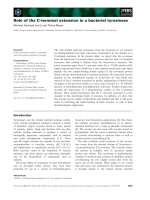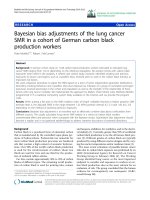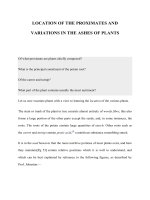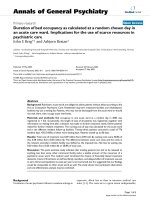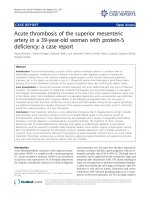Performance of the seaweeds as biofilters in a
Bạn đang xem bản rút gọn của tài liệu. Xem và tải ngay bản đầy đủ của tài liệu tại đây (110.53 KB, 1 trang )
Chaitanawisuti, N., Santhaweesuk, W., & Kritsanapuntu, S. (2011). Performance of
the seaweeds Gracilaria salicornia and Caulerpa lentillifera as biofilters in a
hatchery scale recirculating aquaculture system for juvenile spotted babylons
(Babylonia areolata). Aquaculture international, 19(6), 1139-1150.
Abstract
This study was conducted to determine the feasibility of using seaweeds as
biofilters in a hatchery scale recirculating aquaculture system for juvenile spotted
babylons (Babylonia areolata). Two seaweeds Gracilaria salicornia and Caulerpa
lentillifera were used with three initial biomass levels of each species (280, 560 and
840 g wet weight m−3). Spotted babylon with an average initial shell length of 1.32
± 0.01 cm and body weight of 0.37 ± 0.01 g was used with a stocking density of
300 snails m−2. The experiment was carried out in triplicate over a period of 120
days. Results showed that seawater quality (water temperature, conductivity,
salinity, pH, dissolved oxygen and total suspended solids) gradually changed with
no significant differences between treatments throughout the experimental period,
except alkalinity, total ammonia nitrogen, nitrite–nitrogen, nitrate–nitrogen and
phosphate. Growth rates in weight and shell length of the spotted babylon cultured
in all seaweed treatments used were not significantly different between seaweeds
and density treatments, but significant differences in final survival rate of the
spotted babylon were found between seaweed and density treatments. Growth rate
and biomass gain of C. lentillifera were significantly higher than those of G.
salicornia for all stocking density treatments. This study shows that Gracilaria
salicornia and Caulerpa lentillifera can be used as biofilters for regulating water
quality in a recirculating culture system for spotted babylons.
